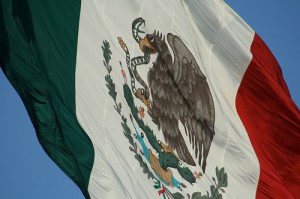Mexico Journalists Sign Narco-Violence Coverage Pact
 What is it that they say about strength and numbers?
What is it that they say about strength and numbers?
40 Mexican media groups that represent more than 700 newspapers, television and radio stations gathered for what looked like a very formal ceremony yesterday to sign an agreement to a set of guidelines concerning their coverage of “criminal violence” in Mexico.
This is unprecedented in two ways. First, it had never been done before because, frankly, it was never needed in the past. And second, it flies in the face of the intimidation, threats and murder that journalists and communications professionals in general have been subject to.
While drug wars rage across Mexico little if anything has been reported in the Mexican media for fear of extreme reprisals – even government officials have been reluctant to admit to the drug cartel siege of many Mexican cities (but that in itself is not so hard to believe). This compact could be a watershed, but it doesn’t necessarily mean that coverage of the drug wars will change.
To hear them tell it, they are protecting the freedom of expression in Mexico. The BBC reported the items on the compact:
The 10-point voluntary agreement says the media should “condemn and reject” organised criminal violence, and cover it in a measured way, putting it in the context of violence elsewhere.
It says the media must not allow itself be used to transmit propaganda for the drug cartels, or make their leaders look like “victims or heroes”.
The accord also notes that Mexico is one of the most dangerous countries in the world for journalists, with more than 20 murdered since 2006.
It says media organisations should do more to protect their staff from violence, and respond in a coordinated way when any individual journalist or media outlet is threatened, intimidated or attacked.
In other points, it says news organisations should:
- protect the rights of victims and children involved in the violence and never release information that puts them at risk.
- treat people arrested as suspects rather than presume they are guilty.
- not publish or broadcast information that endangers police and military operations.
- report any violations of human rights by government security forces.
- encourage Mexican citizens to report crime and help reduce violence without putting themselves at risk.
Mexican President Felipe Calderon was not present at the ceremony, but his office released a statement that said, in part, “Media participation is crucial in building state security policy. We encourage other sectors of society to promote initiatives like this one to confront those who want to destroy the peace and security of all Mexicans.”
Interestingly, some major newspapers, including Reforma, La Jornada and Proceso, did not sign the agreement in part because they felt it would “open the door to a form of prior censorship.”

